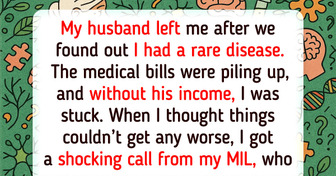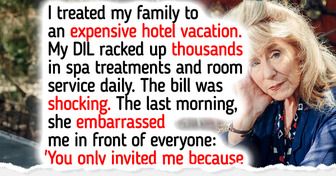12 Men Caught in the Most Disturbing Love Traps

Some stories we receive leave a lasting ache in our hearts, this is one of them. A longtime reader reached out to share her deeply personal journey. She stepped up to raise her grandchildren when no one else would, dedicating years of her life to their well-being. But now that they’re grown, they’ve drifted away, leaving her with silence instead of gratitude. Her story is a powerful reminder of how love, sacrifice, and family don’t always lead to the closeness we hope for.
Hello Bright Side,
I never imagined I’d be writing something like this, but I need advice, or maybe just someone to hear me.
I raised my 3 grandchildren after my son and DIL had passed in a car crash. Instead of enjoying retirement, I went back to work part-time, spent my savings on them.
Now I live with my grandson, but recently I heard him aggressively saying to my granddaughter that he doesn’t want me in his house because I’m too much work. Now that I’m 82, my health isn’t what it used to be.
I can’t work anymore. My savings are gone, and I need somewhere to live. Too many responsibilities. Too stressful.
I left with my suitcase and a plastic bag of medicine. But I didn’t argue. I just made a few calls.
You see, while I gave them all I had, I never told them about one thing: the house I inherited from my parents in the countryside. I never sold it. It’s small, but charming. And it’s mine.
Now, I’m living there quietly. Last week, one of them called, asking if I could help with a down payment. I told them kindly that I was living simply and focusing on myself now.
Was that wrong of me?
Sincerely,
Monica
Thank you, Monica, for trusting us enough to share your situation. We know it’s hard to be alone at any age. We have gathered tips for you to navigate your relationship with your grandchildren.
Losing a child is an unparalleled sorrow. Healing is a personal journey, and parents should allow themselves to feel their pain and to mourn in their own way and time. Self-care is really important, and grieving individuals should be gentle with themselves and seek support when needed. It’s also necessary to express emotions, whether through talking, writing, or other creative outlets, as a means to process the loss.
Taking on the role of a caregiver during retirement can lead to significant emotional challenges. Many retirees find themselves unexpectedly responsible for the care of loved ones, which can result in increased stress, anxiety, and feelings of isolation. This shift often disrupts the anticipated peace of retirement, replacing it with demanding responsibilities that can strain both mental and physical health.
It’s crucial to recognize these emotional impacts and seek support to manage your well-being. Acknowledging the challenges and accessing available resources can help mitigate the emotional toll and promote a healthier caregiving experience.
Experiencing rejection and conflict within one’s family can deeply affect mental health, leading to diminished self-worth, anxiety, and depression. Such emotional strain may result in social withdrawal and, in severe cases, contribute to the development of mental health disorders.
To cope, it’s essential to build supportive relationships outside the family, establish clear personal boundaries, and seek professional therapy. Engaging in self-care activities, such as hobbies or mindfulness practices, can also aid in emotional recovery. Recognizing and addressing these challenges is crucial for fostering resilience and well-being.
Older adults generally experience loneliness and social isolation, which can significantly impact their health. However, even for those who live alone or have limited mobility, there are ways to reconnect and combat these feelings. Countless elderly individuals, especially those over 75, experience loneliness and a lack of social connection. Here’s what you can do to cope with it.
The types of social activities available will depend on where you live, but most communities offer a variety of options to help older adults stay engaged and connected. You might find local singing groups that bring people together through music, or walking clubs that offer gentle exercise and conversation.
Book clubs can provide a space to share ideas and stories, while bridge games, bingo nights, and quiz evenings offer fun and friendly competition. Exploring these activities can be a great way to meet others, build friendships, and ease feelings of loneliness.
If your friends live far away, technology can help you stay connected. Using a computer, smartphone, or tablet, you can send emails, share photos, and make free video calls through apps like Skype, Zoom, or FaceTime. Social media also lets you reconnect with old friends and make new ones. Tablets and phones are easy to use while seated, and tools like stylus pens or voice control can make them more comfortable for those with limited hand mobility.
Don’t wait for others to visit, make the effort to go see them when you can. One of the perks of getting older is access to more affordable public transport. In some places, older adults can travel for free on local buses, though some rural areas may have fewer services.
The age you become eligible for a free bus pass depends on your date of birth and where you live. Taking advantage of these benefits can make staying connected much easier.
Let’s take a break and feel good. Read now and see how a simple gift can change everything in the best possible way.











